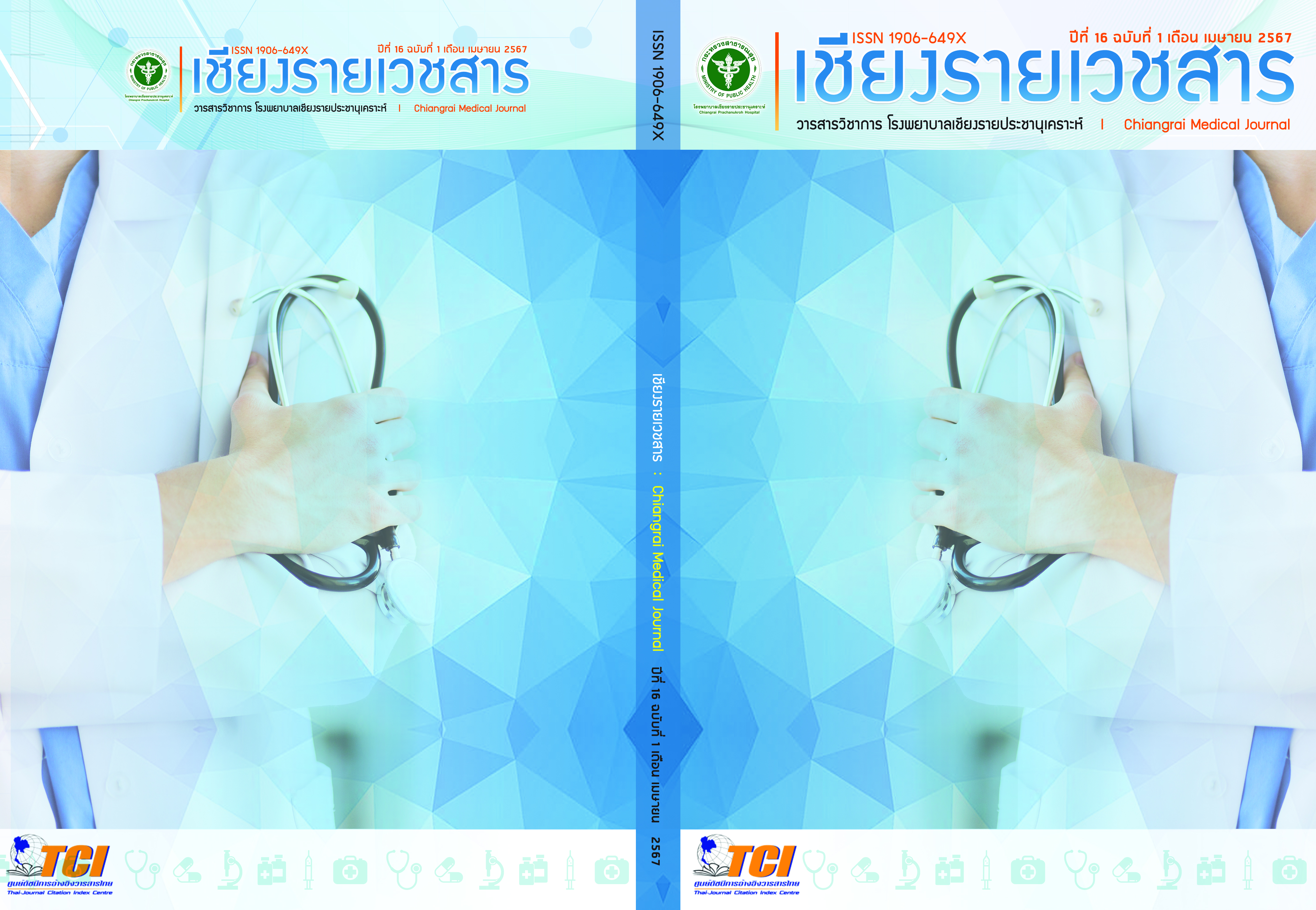การจัดการสุขภาพตนเองของผู้ป่วยที่มีอาการหลการจัดการสุขภาพตนเองของผู้ป่วยที่มีอาการหลงเหลือหลังการหายป่วยโควิด-19 ในตำบลแม่จัน อำเภอแม่จัน จังหวัดเชียงราย
Main Article Content
บทคัดย่อ
ความเป็นมา โรคโควิด-19 เป็นโรคติดต่อที่สำคัญ ผู้ป่วยที่รักษาหายแล้วกลับมีอาการเดิมต่อเนื่อง หรือมีอาการอื่นเกิดขึ้นใหม่และเรื้อรังที่ส่งผลกระทบต่อร่างกายและคุณภาพชีวิตของผู้ป่วยในระยะยาว การศึกษาการจัดการสุขภาพตนเองของผู้ป่วยที่มีอาการหลงเหลือหลังการหายป่วยโควิด-19 สามารถนำไปวางแผนในการดำเนินกิจกรรมในผู้ป่วยที่มีอาการหลงเหลือหลังการหายป่วยโควิด-19 ต่อไปได้
วัตถุประสงค์ เพื่อศึกษาระดับการจัดการสุขภาพตนเองและปัจจัยที่มีความสัมพันธ์กับการจัดการสุขภาพตนเองของผู้ป่วยที่มีอาการหลงเหลือหลังการหายป่วยโควิด-19 ในตำบลแม่จัน อำเภอแม่จัน จังหวัดเชียงราย
วิธีการศึกษา เป็นการวิจัยเชิงพรรณนาแบบภาคตัดขวาง กลุ่มตัวอย่าง คือ ผู้ป่วยที่มีอาการหลงเหลือหลังการหายป่วยโควิด-19 ที่มารับบริการ ณ ศูนย์สุขภาพชุมชนเมืองแม่จัน อำเภอแม่จัน จังหวัดเชียงราย ดำเนินการเก็บรวบรวมด้วยแบบสอบถาม เก็บข้อมูลในช่วงระหว่างเดือนกันยายน - ธันวาคม พ.ศ. 2565 วิเคราะห์ข้อมูลด้วยสถิติเชิงพรรณนา ได้แก่ จำนวน ร้อยละ ค่าเฉลี่ย ส่วนเบี่ยงเบนมาตรฐาน และการวิเคราะห์ความสัมพันธ์ด้วยสถิติไคสแควร์ และสัมประสิทธิ์สหสัมพันธ์สเปียร์แมน กำหนดระดับนัยสำคัญทางสถิติโดยใช้ค่า p<0.05
ผลการศึกษา ระดับการจัดการสุขภาพตนเองของผู้ป่วยกลุ่มตัวอย่างที่มีอาการหลงเหลือหลังการหายป่วยโควิด-19 อยู่ในระดับสูง (𝑥̅= 3.74, +S.D.=0.99) พบว่าระดับการศึกษามีความสัมพันธ์กับระดับการจัดการสุขภาพตนเองของผู้ป่วยกลุ่มนี้อย่างมีนัยสำคัญทางสถิติโดยมีความสัมพันธ์กันในระดับที่ต่ำ (rs=0.236, p=0.018 ,95%CI: 0.051 to 0.416) ส่วนปัจจัยอื่น ๆ ไม่พบว่ามีความสัมพันธ์กับระดับการจัดการสุขภาพตนเองของผู้ป่วยที่มีอาการหลงเหลือหลังการหายป่วยโรคโควิด-19 อย่างมีนัยสำคัญทางสถิติ
สรุปผลและข้อเสนอแนะ ผู้ป่วยบางรายยังคงมีระดับการจัดการสุขภาพตนเองในระดับต่ำถึงปานกลาง หน่วยงานที่เกี่ยวข้องควรนำข้อมูลไปวางแผนและพัฒนาระบบบริการพยาบาลโดยเน้นการส่งเสริมความรู้และความตระหนักในการจัดการสุขภาพตนเองของผู้ป่วยหลังการหายป่วยโควิด-19
Article Details

อนุญาตภายใต้เงื่อนไข Creative Commons Attribution-NonCommercial-NoDerivatives 4.0 International License.
เอกสารอ้างอิง
World Health Organization. WHO Coronavirus (COVID-19) Dashboard [Internet]. [cited 2023 Sep 1]. Available from: https://covid19.who.int/
Department of Disease Control, Ministry of Public Health. Thailand Covid-19 Situation [Thailand]. 2023 [cited 2023 Sep 1]. Available from: https://ddc.moph.go.th/covid19-dashboard/
Lotfi M, Hamblin MR, Rezaei N. COVID-19: Transmission, prevention, and potential therapeutic opportunities. Clin Chim Acta. 2020;508:254-66.
Hu B, Guo H, Zhou P, Shi ZL. Characteristics of SARS-CoV-2 and COVID-19. Nat Rev Microbiol. 2021 ;19(3):141-54.
Tantipasawasin S. Long Covid. Chonburi Hosp J. 2022;47(1):1-2.
Wangchalabovorn M, Weerametachai S, Leesri T. Prevalence of post COVID-19 conditions in SARS-CoV-2infected patients at 3-month telephone follow-up. RHPC9Journal. 2022; 16(1):265-84.
Wongsermsin S, Chinoraso J, Yeekian C. Symptom and factors effect on severity of Long Covid. Chonburi Hosp J. 2022; 47(3):233-40.
Bartholomew LK, Czyzewski DI, Parcel GS, Swank PR, Sockrider MM, Mariotto MJ, et al. Self-management of cystic fibrosis: short-term outcomes of the Cystic Fibrosis Family Education Program. Health Educ Behav. 1997;24(5):652-66.
Swannakit S, Wanchai A, Sangkhamkul C, Poonsub A. Self-management behaviors of persons with type 2 diabetes living in urban area. BCNUT J Nurs. 2021; 13(1):225-7.
Boontein P, Poungkaew A, Praphasil O, Kuakool P. Factors predicting self-management behavior in patients with type II diabetes. NURS SCI J THAIL. 2021;39(1):13-23.
Jiopraditkul S. Self–care behaviors and blood pressure controlling ability of essential hypertension patients, Muang Potawas Primary Care Unit. Journal of Health Research and Innovation. 2020;3(1):15-30.
Roongrueang J, Srisookkum T. Long Covid-19 and self-management behavior among village health volunteers who infected Covid-19 in Nanoi District, Nan Province. The Office of Disease Prevention and Control 10th Journal. 2023;21(1):37-51.
Thakkham S, Srisookkhum T. Long COVID-19 and factors related to self-care behaviors of COVID-19 patients in Kluang Sub-district, Chiang Khong District, Chiang Rai Province. Journal of Disease Prevention and Control : DPC.2 Phisanulok. 2023;10(2):49-66.
Likitkulthanaporn S, Wattanakul B, Leardrungchaisakul R. Development of self-management support for self-management behaviors in the Post-COVID 19 patients on residual symptoms in Covid-19 patients healed. Bull Dept Med Serv. 2022;47(3):104-12.
Mae Chan Community Health Center, Medical Records and Statistics Unit. Covid-19 Statistic in Mae Chan District, Chiangrai Province. Chiangrai: Mae Chan Hospital, Ministry of Public Health; 2022.
Akakul T. Research methodology in behavioral sciences and social sciences. 5th ed. Ubon Ratchathani: Witthaya offset Printing; 2007.
Best JW. Research in education. Englewood Cliffs, New Jersey: Prentice Hall; 1977.
Channarong M. Factors relating to post discharge persistence of symptoms after hospitalization among person with coronavirus disease 2019. Journal of Health and Nursing Education. 2022; 28(1):1-16.
Sinthununsakul N. Factors associated with residual symptoms of COVID-19 virus at infection among health care personnel Roi Et Hospital. Srinagarind Med J. 2023;38(1):77-86.
Tancharoensukjit T. Prevalence and factors associated with post acute COVID syndrome (Long COVID) in patients infected coronavirus disease 2019 who received inpatient treatment Lan Krabue Hospital. Bull Dept Med Serv. 2023;48(1):51-9.
Pragobsuk A, Kittijirapong C. Long COVID and health care. Thai Pharm Health Sci J. 2022;17(4):427-33.
Kampan P. Long COVID and Long-term pulmonary complications of COVID-19. Journal of Charoenkrung Pracharak Hospital. 2022;18(2):79-96.


